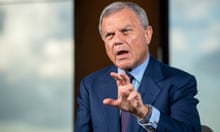Several of Britain’s best-known companies, including Burberry, Sky and Sports Direct, are included on a list ordered by the prime minister of firms rewarding bosses with “fat cat pay” and representing the “unacceptable face of capitalism”.
More than a fifth of Britain’s FTSE listed-firms are included on the “name and shame” register of companies that Theresa May said risk damaging “the social fabric of our country” by paying bosses too much money.
May ordered the creation of the world’s first public register of companies that ignored shareholder concerns and awarded “pay rises to bosses that far outstrip the company’s performance” in August. She said calling out the firms would help tackle the “abuses and excess in the boardroom” and restore public confidence in big business.
The public register was published on Tuesday by the Investment Association, a trade body of investment firms that manage the pensions of million of Britons.
The register lists every company in the FTSE All-Share Index which has suffered at least a 20% shareholder rebellion against proposals for executives pay, re-election of directors or other resolution at their shareholder meetings.
Companies on the register include fashion label Burberry, broadcaster Sky, retailer Sports Direct and Sir Martin Sorrell’s advertising company WPP.
Others on the list include banking giant HSBC, supermarket Morrisons, BT, estate agent Foxtons, the AA and Mothercare.
Chris Cummings, chief executive of the Investment Association, said the register “reveals the true scale of investor concern” and shows how many shareholders are “flexing their muscles by exercising their votes”.
Cummings said the fact that 22% of companies in the FTSE All-Share are included on the list shows that “a significant number of companies need to seriously start listening to shareholders views and acting on them”.
Greg Clark, the business secretary, said he hoped the public register would increase pressure on the “minority of firms that threaten the world-leading reputation of our business community”.
“It is right that we review and refresh our standards to ensure we continue to have the highest reputation,” he said. “This world-first public register, does exactly that, shining a spotlight on how companies respond to shareholders’ concerns over important decisions, including executive pay packages.
“This will help to strengthen transparency and corporate accountability and build on our reputation as a world-leading business environment – a key foundation of our industrial strategy.”
The public register, which will be continuously updated, also includes companies that withdrew or amended pay packages in the wake of shareholder discontent in the run up to votes. It also includes companies’ statements on how they intend to address investors concerns.
When she announced plans for the register, May said: “Too often in recent years, we have also seen another, unacceptable, face of capitalism. A minority of firms are falling short of the high standards we expect of them. Some have deliberately broken rules that are designed to protect their workers.
“Others have ignored the concerns of their shareholders by awarding pay rises to bosses that far outstrip the company’s performance.
“When big businesses are brought into disrepute, public trust in an open, free-enterprise economy is weakened. It is bad for individual workers and companies, but also damages the social fabric of our country. It emboldens those on the far left who hate to see business succeed.”
May originally raised the prospect of a crackdown on executive pay in her Conservative party leadership bid in July 2016 in a speech that included proposals to allow employee and consumer representatives to sit on company boards, and make shareholder votes on executive pay legally binding.
However, when a green paper was published in November last year the prime minister faced criticism from unions for backtracking on installing workers’ representatives on boards, while opposition MPs questioned whether enough safeguards were being put in place to avoid a rerun of the debacle at the collapsed department store chain BHS.
Companies on the register include:
Morrisons
A 48% vote against plans – rising to 51% with abstentions – to increase the maximum long-term bonus for chief executive, David Potts, from 240% of his basic salary of £850,000 to up to 300%.
Burberry
A 32% vote against payouts to Christopher Bailey, who was giving up his role as chief executive to focus on creative work, over a rise in pay from £1.9m to £3.5m and receipt of £10.5m shares. Julie Brown, new chief operating offer, tried to head off a row by handing back £800,000 of shares and a further £1.6m of additional share awards.
WPP
A 21% vote against £48m for chief executive Sir Martin Sorrell even though the total package was more than 30% lower than the £70.4m he received in 2015.
Sports Direct
More than 70% of independent shareholders voted against a proposed £11m payout to founder Mike Ashley’s brother, John. The payment was blocked and the company said it now “considers all these matters to be closed”.
Sky
A 29% vote against £16m pay deal for chief executive Jeremy Darroch, largely because of a payout of nearly £12m under a long-term incentive plan. Only 51.6% of shareholders backed James Murdoch as chairman.










